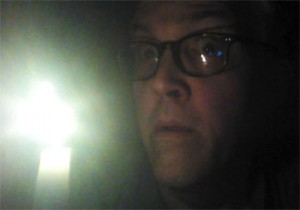Abstract: “Accounts of Some Strange Disturbances” is an expanding collection of essays dealing with dark fantasy stories written in the 19th and 20th centuries.
* * *
Nothing makes a person more attractive than keeping odd hours — and being translucent.
I completely understand why someone would want to investigate shrieks coming from a sub-basement at 3:00 AM — armed with only a sputtering candelabra.
And I totally get why a concerned citizen would be willing to hold a stake against the local vampire’s ribcage, as a fellow Van Helsing-type prepares to strike with an outsized wooden mallet. Makes sense, as long as the striker’s hand-eye coordination is good.
I am inordinately fond of dismal ruins and desolate tracts of land, family curses and malevolent familiars, ancient tomes containing arcane knowledge, paintings that have been known to change when no one’s looking, and mysterious figures attempting to remain unidentified as they scurry across broken battlements.
I’ve had a fixation on this sort of thing ever since the day, decades ago, when my mother told me that here was a book she’d thought I’d like, and handed me an anthology of stories by Edgar Allan Poe (thank you, mom).
I’m an enthusiast. I am a fan of British ghost stories from their golden age, during the Victorian and Edwardian eras; a connoisseur of American weird tales from the twenties and thirties; and a positive nut for writers whose work is creepy as hell while being sui generis, people like Robert Aickman, Shirley Jackson, and Fritz Leiber.
All such stories share certain characteristics:
- They’re set in consensus reality, the place where each of us lives, eats, works, dreams, stubs toes, falls in love, and so forth. They do not take place in completely imaginary realms such as Atlantis, Never-Never Land, Middle Earth, or anywhere other than our own strange and familiar planet.
- They may be set in the present, or in a specific historical period, but never in the future.
- They present events that are supernatural (or which could be) without rationalization. Certainly, many of the most effective pieces of supernatural fiction are deliberately ambiguous. We’ll be looking at many such stories on this site, but none with Scooby-Doo endings, in which all the odd events are tidily explained away.
Apart from content, all of the stuff I like has this in common: brevity. I’m a devotee of the tale, the short story, and the novelette. I appreciate their concision, and the skill of their authors when it comes to fitting a lot within a small space. Out of all the forms that fiction takes, I’ve found that these are the ones least likely to waste my time.
My goal is to introduce these stories to new readers. To that end, this site (when complete) will present 50 critical essays on significant supernatural short stories, both famous and unjustly ignored. That’ll be enough to form a solid crash course in the genre.
If you’re a long-time fan or an academic, I do hope that you’ll find this site entertaining and worth your time, but it’s the newbies I’m concentrating on. Not enough people out there are familiar with C. L. Moore or Erckmann-Chatrian, let alone M. R. James or Algernon Blackwood. To me, this is like having never eaten an ice cream sandwich, or drunk a old-school dry martini, or smelled wildflowers wafting on the breeze. Such people are missing something good. I’d like to change that.
With all of that in mind, welcome to Accounts of Some Strange Disturbances. We’ve put you in the room in the tower, the one that faces away from the sun. And please keep in mind that when we lock you in for the night, why, that’s because we’re concerned for your well-being. You could trip and fall down the spiral staircase in the dark, as have so many others.
We knew you’d approve. Dinner is at seven, sharp. Don’t be late.
Steve Luttrell
May 2013
